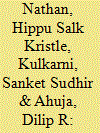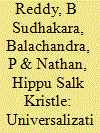|
|
|
Sort Order |
|
|
|
Items / Page
|
|
|
|
|
|
|
| Srl | Item |
| 1 |
ID:
125706


|
|
|
|
|
| Publication |
2013.
|
| Summary/Abstract |
India's energy situation is characterized by increasing energy demand, high fossil fuel dependency, large import shares, and significant portion of population deprived of modern energy services. At this juncture, natural gas, being the cleanest fossil fuel with high efficiency and cost effectiveness, is expected to play an important role. India, with only 0.6% of proven world reserves, is not endowed with adequate natural gas domestically. Nevertheless, there are gas reserves in neighbouring regions which gives rise to the prospects of three cross border gas pipeline projects, namely, Iran-Pakistan-India, Turkmenistan-Afghanistan-Pakistan-India, and Myanmar-Bangladesh-India. This study is a political analysis of these pipeline projects. First, it provides justification on use of natural gas and promotion of cross border energy trade. Then it examines these three pipeline projects and analyses the security concerns, role of different actors, their positions, shifting goals, and strategies. The study develops scenarios on the basis of changing circumstances and discusses some of the pertinent issues like technology options for underground/underwater pipelines and role of private players. It also explores impact of India's broader foreign relations and role of SAARC on the future of pipelines and proposes energy induced mutually assured protection (MAP) as a concept for regional security.
|
|
|
|
|
|
|
|
|
|
|
|
|
|
|
|
| 2 |
ID:
176755


|
|
|
|
|
| Summary/Abstract |
Measurement of energy poverty has been a missing priority in energy research. There is hardly any consensus regarding whether to consider energy as a resource or capacity, output or outcome, and quantity or service. In this paper, we revisit major approaches in literature to assess energy poverty: economic, engineering, and access-based, including others. We critique the economic and engineering approaches for the arbitrariness of cut-offs and the misplaced emphasis on less meaningful energy quantity. Finding the access-based approach most suitable, we propose a method of assessing energy poverty based on deprivation in modern cooking and lighting fuels. We divide the energy-poor into three groups: transitional, moderate, and extreme energy-poor. We apply the method to India's urban areas of different states and union territories using the national sample survey data. The results reveal energy poverty to be primarily dictated by deprivation in cooking and a greater incidence of energy poverty in larger states. In contrast to conventional measures, we compute the depth and severity of energy poverty only for energy-poor as opposed to for the entire population. These complementary measures depict energy poverty of energy-poor more accurately and therefore will direct the attention of pro-poor energy policies and programmes appropriately.
|
|
|
|
|
|
|
|
|
|
|
|
|
|
|
|
| 3 |
ID:
092783


|
|
|
|
|
| Publication |
2009.
|
| Summary/Abstract |
Provision of modern energy services for cooking (with gaseous fuels) and lighting (with electricity) is an essential component of any policy aiming to address health, education or welfare issues; yet it gets little attention from policy-makers. Secure, adequate, low-cost energy of quality and convenience is core to the delivery of these services. The present study analyses the energy consumption pattern of Indian domestic sector and examines the urban-rural divide and income energy linkage. A comprehensive analysis is done to estimate the cost for providing modern energy services to everyone by 2030. A public-private partnership-driven business model, with entrepreneurship at the core, is developed with institutional, financing and pricing mechanisms for diffusion of energy services. This approach, termed as EMPOWERS (entrepreneurship model for provision of wholesome energy-related basic services), if adopted, can facilitate large-scale dissemination of energy-efficient and renewable technologies like small-scale biogas/biofuel plants, and distributed power generation technologies to provide clean, safe, reliable and sustainable energy to rural households and urban poor. It is expected to integrate the processes of market transformation and entrepreneurship development involving government, NGOs, financial institutions and community groups as stakeholders.
|
|
|
|
|
|
|
|
|
|
|
|
|
|
|
|
|
|
|
|
|